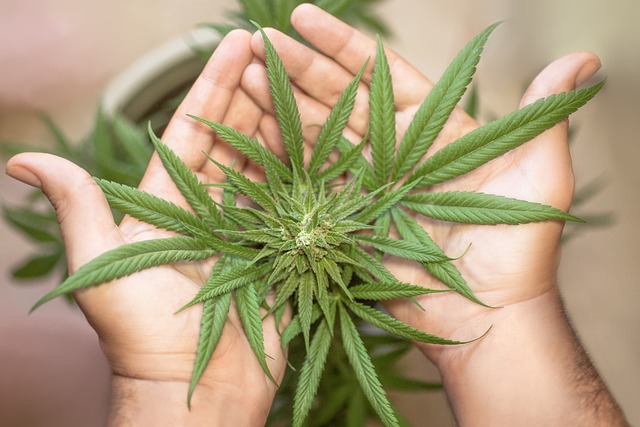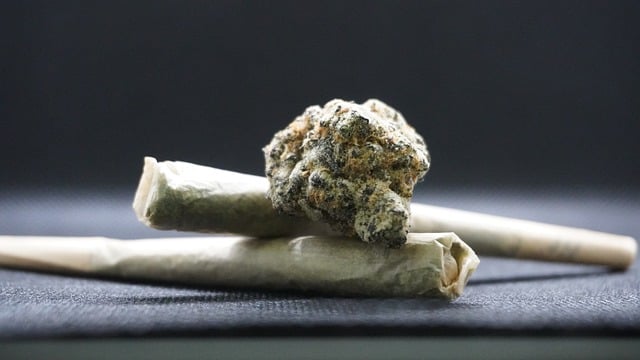The THCA flower, a non-psychoactive precursor to THC, has gained recognition for its potential therapeutic benefits, which are enhanced by the presence of terpenes within cannabis. These compounds contribute to the unique aroma and flavor and interact with THCA to amplify its medicinal properties, known as the entourage effect. The synergy between THCA and terpenes is thought to offer relief from various conditions due to its anti-inflammatory, neuroprotective, and analgesic effects. Ongoing research into the THCA flower's terpenes and cannabinoids continues to shed light on its potential in promoting health and wellness. It's crucial for users to consider dosage and strain selection carefully, taking into account individual differences and potential side effects like dry mouth and eyes, memory impairment, mood changes, and the psychoactive impact of THCA converting to THC. Those considering the THCA flower for therapeutic purposes should consult with healthcare professionals, especially if they have pre-existing health conditions.
Exploring the nuanced interplay of terpenes and cannabinoids within THCA flower, this article sheds light on the subtle side effects associated with its consumption. Delve into the therapeutic properties and potential health implications of this nascent compound, understanding its effects is crucial for informed decision-making. Join us as we uncover the science behind THCA flower and its components, ensuring a comprehensive overview for consumers to navigate this complex landscape.
- Unraveling the Effects of THCA Flower: A Deep Dive into Terpenes and Cannabinoids
- The Interplay of Terpenes and Cannabinoids in THCA Flower: Potential Side Effects and Considerations for Consumers
Unraveling the Effects of THCA Flower: A Deep Dive into Terpenes and Cannabinoids

The exploration into the effects of THCA (Tetrahydrocannabinolic Acid) flower is a fascinating journey through the complex interplay of terpenes and cannabinoids within the cannabis plant. Unlike its more famous counterpart, THC (Tetrahydrocannabinol), THCA is non-psychoactive, presenting opportunities for research into its potential wellness applications without the mind-altering effects. A key element in understanding the effects of THCA flower is the role of terpenes, which are aromatic compounds found in various plants and flowers, including cannabis. These terpenes not only contribute to the unique scent and flavor profiles but also interact synergistically with cannabinoids like THCA, influencing the overall therapeutic properties. For instance, myrcene is known for its sedative effects, while limonene is associated with mood elevation and energy. The entourage effect, a term coined to describe this synergy between terpenes and cannabinoids, suggests that the combined effect of these compounds may be greater than the sum of their individual effects, potentially offering a broader spectrum of benefits. As such, consumers and researchers alike are intrigued by the therapeutic potential of THCA flower, which is believed to offer relief from various conditions due to its anti-inflammatory, neuroprotective, and analgesic properties. With ongoing research in the field of cannabinoid science, the understanding of THCA flower’s effects continues to evolve, promising a wealth of information on this natural remedy’s role in human health and wellness.
The Interplay of Terpenes and Cannabinoids in THCA Flower: Potential Side Effects and Considerations for Consumers

The THCA flower, a raw form of cannabis that contains tetrahydrocannabinolic acid (THCa), is known for its potential therapeutic properties. It’s rich in terpenes and cannabinoids, each playing a significant role in the plant’s effects. Terpenes, the aromatic compounds found in the flower, not only contribute to its distinct scents and flavors but also interact synergistically with cannabinoids like THCa to influence the body’s endocannabinoid system. This interplay can modulate various physiological responses and effects, which may include pain relief, anxiety reduction, and anti-inflammatory benefits. However, consumers should be aware of potential side effects associated with THCa flower consumption. These may include dry mouth and eyes, short-term memory impairment, altered mood, and possible psychoactive effects due to the presence of THCa, which can convert to THC under heat or degradation. It’s crucial for consumers to approach THCA flower use with caution, especially as individual sensitivities to terpenes and cannabinoids can vary significantly. Dosage and strain selection should be considered carefully, with an understanding of one’s unique physiology and the intended therapeutic goal. Users should also be mindful of their overall health status and consult with healthcare professionals if they have concerns or pre-existing conditions that could be affected by cannabinoid and terpene interactions.
In conclusion, the exploration of THCA flower’s terpenes and cannabinoids has shed light on the complex interplay that influences its effects. While THCA flower is lauded for its potential therapeutic properties, it is imperative to approach its consumption with cautious consideration of the associated side effects. Users should be aware of how individual physiology can interact differently with these compounds, thereby affecting experiences and outcomes. As with any substance, personal responsibility in use and understanding the nuanced effects of THCA flower terpenes and cannabinoids is key. By staying informed and mindful, consumers can optimize their experience while mitigating potential negative impacts.
